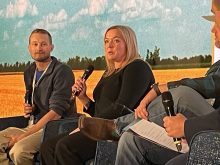LETHBRIDGE
The natural response to high prices is to plant more to compensate for the lower price, right?
Wrong, says Jerry Wright, chief executive officer of the United Potato Growers of Idaho, a member co-op of the United Potato Growers of America. He says potato growers are masters of their own destiny in the supply-demand equation.
Wright provided growers at a United Potato Growers of Canada information session here in late February with a list of factors to consider.
“It’s a giant game of chess. If you think you guys can guess what the processors are going to do or what the market will do, you’re wrong. Eventually you start playing against each other and you lose sight of the whole game. You’re all trying to make money, so why not make money together?”
Read Also

Alberta boosts investment in wetland restoration
The province plans to add 67 hectares of new wetlands to strengthen natural flood and drought defences and improve water quality.
As a former employee of food processing giants ConAgra, General Mills and Heinz, Wright knows how the game is played.
“It’s all about data – you can’t play these games without data,” says Wright. And whoever has the better data has the advantage. That’s where the United Potato Growers of America comes in.
When the United Fresh Potato Growers of Idaho was formed in 2004 by a group of growers, no one expected it to last more than a year, says Wright. Now, five years later, and with the creation of the United Potato Growers of America in 2005, the national organization enables growers across the United States to realize higher profits than ever before by providing solid market information.
Undersupply the market?
Take Wisconsin, for example. Wright says growers there have been cutting acres over the past several years to match supply. In some cases, they even undersupplied the market. The result – increased profits, as high as $69 million last year.
“Some growers in Wisconsin are paying off entire farm mortgages in cash and that’s not an exaggeration,” says Wright. “When you control the market, this is what could happen. Yes, you’re shipping less, but at least you’re making money.”
So how did Wisconsin make $69 million? By planting fewer potatoes. The problem is that since prices were so good last year, growers want to plant more potatoes, but Wright says that’s the wrong way of thinking. “You need to look forward to see what you’re up against,” he says. “Don’t look out your rear view mirror at last season because you won’t see the future marketplace ahead of you.”
Wright provided a list to consider for 2009. First, there’s a declining demand for potatoes in North American homes and restaurants. According to Wright, 75 per cent of American homes still have potatoes on the menu, but that’s a decrease from previous years. Furthermore, the frequency of use (times per week) is less.
“Most of your processed potatoes goes to restaurants and that’s where you’ll feel it,” says Wright. He says forecasts for 2009 are that U. S. demand will decrease by 1.6 per cent and fries will be down 2 per cent. “If a college student has the choice between a $1 value cheeseburger at McDonald’s and a $1 value small fries, what do you think he will choose?”
Wright says to make matters worse, the potato yield goes up every year. “You produce about 400 pounds more per acre every year because of efficiencies – you’re good producers.” Still, that means that even more acres should be cut to meet demand.
Wright concludes with his recommendations: don’t plant a single acre that does not have a solid history of profitable pricing, understand your packers’ sales plans and track them, and promote the use of fresh potatoes.
To processed potato growers in southern Alberta, Wright says “Don’t plant acres that aren’t contracted and try to make the contract acre-based rather than tonnage-based.”














